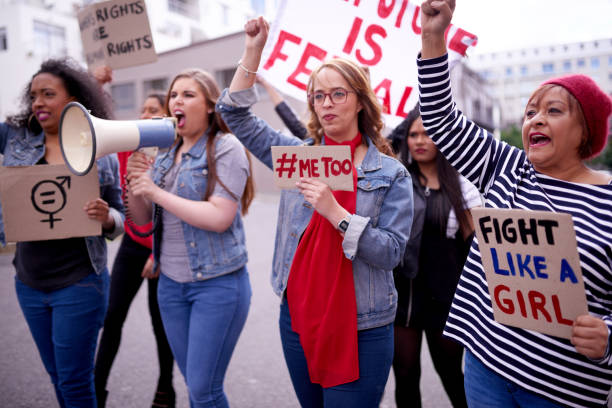
The Oxford Dictionary defines feminism as promoting women’s rights based on gender equality. Its understanding, however, remains elusive for many. Feminism began when women demanded voting rights, birthing first-wave feminism.
Second-wave feminism fought for workplace equal pay and opportunities. Today, third-wave feminism tackles issues like exploitation, equal pay, sexual assault, and women’s presence in authoritative positions.
The third wave, commencing in the 1990s, aimed to rectify racism and classism in prior feminist movements. Feminists like Kimberlé Williams Crenshaw and Rebecca Walker spearheaded concepts of intersectionality and identity politics, fostering inclusivity within feminism. Concurrently, the ‘riot grrrl’ movement emerged, echoing intersectionality demands and invigorating punk rock scene.
The fourth wave, beginning in the late 2000s, strives for greater gender equality and women’s rights recognition. It encompasses equal pay, sexual violence, representation of underrepresented groups like the disabled, and body positivity.
This wave also criticizes capitalism‘s profit from “female empowerment” trends in media and advertising. Viral campaigns like #MeToo globalized discussions about oppressive systems rooted in racism, sexual harassment, and misogyny, spotlighting workplace sexism and intimidation.
Types of Feminism
There isn’t just one form of feminism; there are many different types. All of which strive to address the various forms of prejudice that women suffer.
Cultural feminism
Cultural feminism is the separatist belief that women are born with an evolved essence that distinguishes them from men and grants them societal advantages that have previously been viewed as flaws by society. Women’s perspectives should be given more weight, according to cultural feminists.
Some critics contend that cultural feminism is overly reliant on the “essentialist” assumptions of society’s gender binary. However, in most circumstances, cultural feminism contends that a woman’s perspective on the world is superior to that of men. This viewpoint attempts to bring all women together, regardless of ethnicity, race, socioeconomic status, or age.
Marxist and socialist feminism
Marxism has analyzed unpaid, reproductive “women’s labour” as an intrinsic aspect of capitalism since the 1840s. Marxism has a direct impact on socialist feminists, who contend that capitalism was created specifically to favour patriarchal structures and to support women’s subjugation. To achieve gender equality, socialist and Marxist feminism argues that capitalist economic structures that exploit and undervalue women’s labour must be dismantled.
Although there are some similarities between socialist feminism and cultural feminism, they are substantially different. Cultural feminism concentrates almost entirely on the female gender’s particular features and accomplishments in comparison to men’s, whereas socialist feminism opposes this.
Working with males to ensure a level playing field for both genders is the goal of socialist feminism. Cultural feminism has been labelled “condescending” by socialist feminists.
Radical feminism
Radical feminists think that society favours the male experience, and that gender roles are so deeply established in every aspect of modern life that true equality requires a thorough reform of the current cultural order.
Existing political and social structures are opposed by radical feminism because they are essentially patriarchal. As a result, radical feminists are wary of political action inside the current system, preferring instead to focus on cultural change that weakens patriarchy and its attendant hierarchical institutions.
Patriarchy, not men, is what radical feminism rejects. To equate radical feminism with man-hating assumes that patriarchy and men are philosophically and politically inextricably linked.
Liberal feminism
This type of feminism, sometimes known as “mainstream feminism,” focuses on obtaining women’s rights and social justice through legal and political reforms that are applied to existing social structures. Liberal feminists advocate for more male engagement in child care and marriage as an equal partnership.
Innovative Tech Solutions, Tailored for You
Our leading tech firm crafts custom software, web & mobile apps, designed with your unique needs in mind. Elevate your business with cutting-edge solutions no one else can offer.
Start NowSupport for abortion and other reproductive rights is linked to a sense of control and autonomy over one’s own life. Putting an end to domestic abuse and sexual harassment removes barriers to women gaining equality with men.
Gender equality in the public domain, such as equal access to school, equal pay, ending employment sex segregation, and better working conditions, is the core goal of liberal feminism. From this perspective, legal changes would enable these objectives to be realized.
Issues in the private realm are of significance because they influence or obstruct equality in the public arena. Gaining equal access to traditionally male-dominated occupations, as well as being compensated and promoted similarly, is a critical goal.
Multiracial feminism
Women of colour have traditionally been active participants in issues affecting women. Their experience with feminist labour, on the other hand, has been mostly ignored and unreported.
Multiracial feminism refers to the activist and scholarly work done to promote race, class, and gender equality by women of colour and anti-racist white supporters. Feminists who are women of colour resist separating oppression and insist on recognizing the intersectionality of race, class, and gender oppression, in contrast to the well-documented second-wave white, middle-class feminists, who centred on abolishing patriarchy and privileged patriarchy as oppression over all others.
Multiracial feminism seeks to educate individuals about how race shapes gender roles and oppression. Multiracial feminists represent marginalized groups of women such as Asian, Latina, and Black women.
Conclusion
Feminism is a multifaceted movement that focuses on topics that affect many aspects of our lives, such as reproductive rights, workplace culture, and caregiving. While it seems it may have lost its way in 2022, there are still many feminists and feminist organizations that are actively working towards achieving a more equal world where men and women view each other as peers and not superior and subordinate.
Before You Go…
Hey, thank you for reading this blog to the end. I hope it was helpful. Let me tell you a little bit about Nicholas Idoko Technologies. We help businesses and companies build an online presence by developing web, mobile, desktop, and blockchain applications.
We also help aspiring software developers and programmers learn the skills they need to have a successful career. Take your first step to becoming a programming boss by joining our Learn To Code academy today!
Be sure to contact us if you need more information or have any questions! We are readily available.









